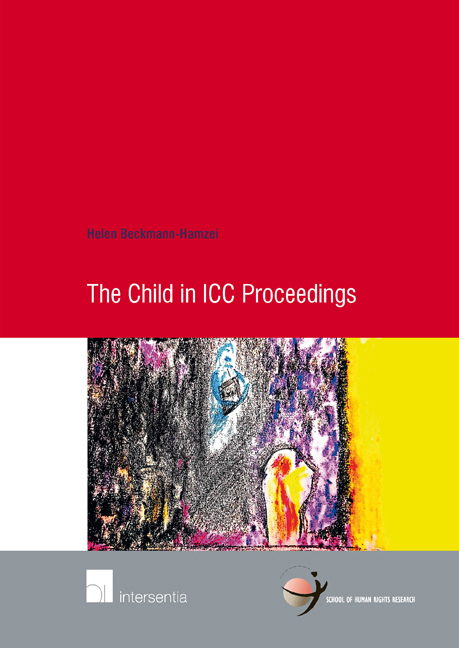Book contents
- Frontmatter
- Acknowledgments
- Contents
- List of Abbreviations
- Introduction
- Part I The Child in International Criminal Proceedings
- Chapter 2 The Child Witness
- Chapter 3 The Child Victim
- Chapter 4 The Child Perpetrator and the Child of a(n) (alleged) Perpetrator
- Part II The Child in International Reparation Practice
- Part III Concluding and Comparative Evaluation
- Summary
- Samenvatting
- Selected Bibliography
- Overview of Legislation
- Overview of Cases
- Curriculum Vitae
- Titles Published in the School of Human Rights Research Series
Chapter 4 - The Child Perpetrator and the Child of a(n) (alleged) Perpetrator
from Part I - The Child in International Criminal Proceedings
Published online by Cambridge University Press: 12 December 2017
- Frontmatter
- Acknowledgments
- Contents
- List of Abbreviations
- Introduction
- Part I The Child in International Criminal Proceedings
- Chapter 2 The Child Witness
- Chapter 3 The Child Victim
- Chapter 4 The Child Perpetrator and the Child of a(n) (alleged) Perpetrator
- Part II The Child in International Reparation Practice
- Part III Concluding and Comparative Evaluation
- Summary
- Samenvatting
- Selected Bibliography
- Overview of Legislation
- Overview of Cases
- Curriculum Vitae
- Titles Published in the School of Human Rights Research Series
Summary
INTRODUCTION
The current chapter focusses in more detail on the fact that children themselves can qualify as perpetrators of international crimes and the possibility to prosecute child perpetrators internationally. In addition, the chapter examines the procedural implications when a child of a(n) (alleged) perpetrator is involved in the course of the criminal proceedings before the International Criminal Court.
Children participate as soldiers in hostilities. The phenomenon of child soldiers and their involvement in conflict situations is a continuing reality. Today's estimated number of child soldiers amounts to more than 300,000 children. As a consequence of their recruitment, children have committed and continue to commit the most atrocious acts amounting to international crimes, such as war crimes and crimes against humanity. The procedural capacity of the child perpetrator under international criminal law, to date, only concerns children between the age of fifteen and eighteen years at the moment of crime commission. The question raised with regard to this procedural capacity reads as follows: Are the best interests of the child taken into account when considering the international criminal prosecution of (alleged) child perpetrators?
The capacity of the child of a(n) (alleged) perpetrator is not a strictly legal one. This is because it is derived from the child's parent who is charged with or convicted for international crimes. Being the child of a(n) (alleged) perpetrator might bear numerous and far reaching consequences. The child is likely to be confronted with the factual and often lengthy separation from his/her parent considering that institutions, such as the ad hoc Tribunals or the ICC in The Hague, are situated far away from their home and proceedings (including detention) tend to last for several years. The parent's involvement in criminal proceedings may also lead to stigmatisation and exclusion of the child in his/her community. In addition to these non-legal consequences, a number of issues arose in the practice of the ICC which anticipate that certain decisions taken by the Court may have particular consequences for the child and may therefore require that the Court sufficiently takes into account that decisions addressed at the (alleged) perpetrator may have implications for the child.
- Type
- Chapter
- Information
- The Child in ICC Proceedings , pp. 137 - 148Publisher: IntersentiaPrint publication year: 2015



